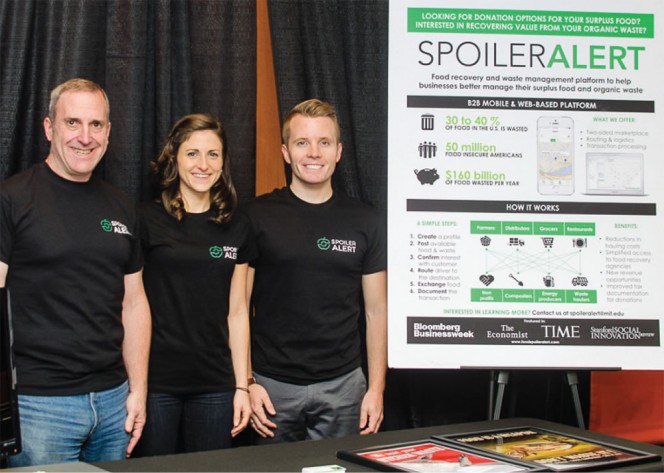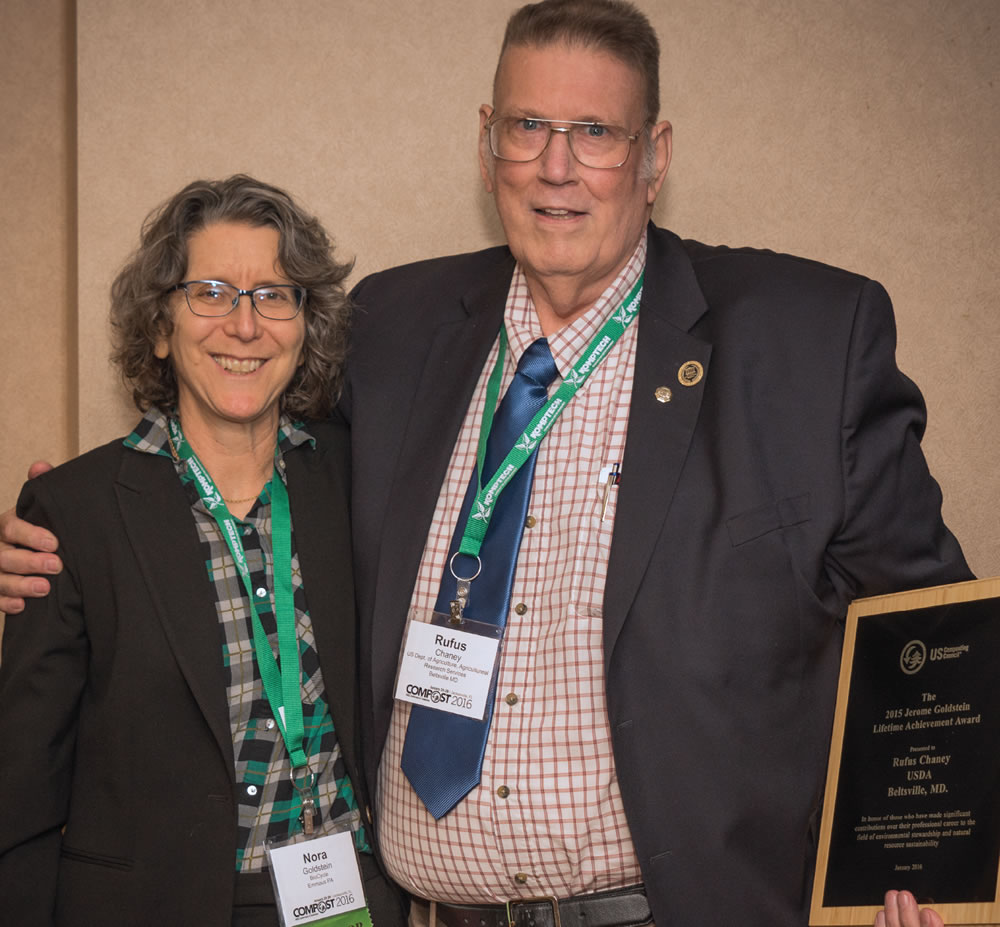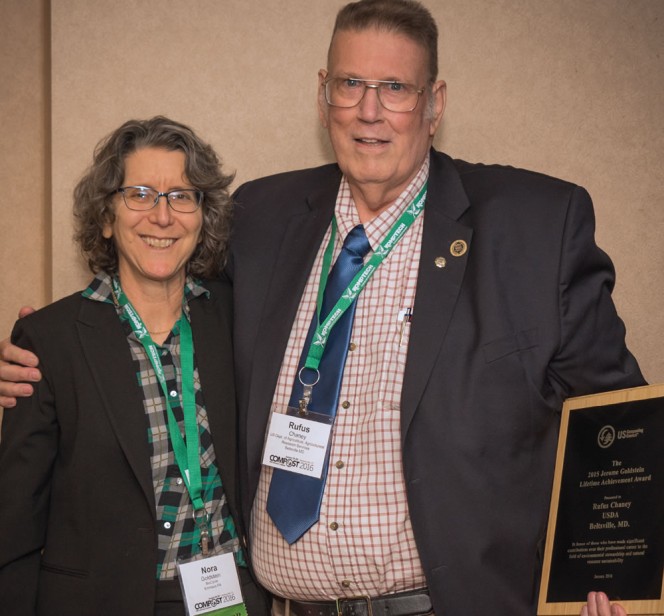BioCycle March/April 2016
Rufus Chaney Receives Lifetime Achievement Award
Dr. Rufus Chaney, a Senior Research Agronomist in the Crop Systems and Global Change Laboratory of the
USDA-Agricultural Research Service in Beltsville, Maryland, was awarded the Jerome Goldstein Lifetime Achievement Award at the US Composting Council’s (USCC) 2016 Conference in Jacksonville, Florida in January. The Award, created by the USCC in 2009 in honor of Jerome Goldstein, founder of BioCycle, is given to an individual who has achieved excellence in their field of study and who has made significant contributions to the field of environmental stewardship and natural resource sustainability in his or her lifetime. Dr. Chaney is a leading authority on the fate, food-chain transfer, and potential effects of soil microelements. BioCycle Editor Nora Goldstein had the honor of presenting the Jerome Goldstein Lifetime Achievement Award to Dr. Chaney at the USCC Conference.
BioCycle has reported for over three decades on his research related to plant uptake of metals and translocation to edible plant tissues; speciation of metals in plants and bioavailability to animals; development of hyperaccumulator crops to phytoextract and recycle metals in contaminated soils; bioavailability of lead and other metals in soils, biosolids and composts directly ingested by animals; and development of “tailor-made composts and biosolids” to remediate lead, zinc, cadmium, nickel and other element-contaminated soils, including soils in urban gardens. Dr. Chaney was among the researchers in the 1970s who developed the Beltsville aerated static pile composting method. His research on plant uptake of metals and their bioavailability was critical to development of the U.S. EPA’s 40 CFR Part 503 biosolids regulations.
Roadmap To Reduce U.S. Food Waste
The “Roadmap To Reduce U.S. Food Waste By 20 Percent,” officially released by ReFED on March 9,2016 is the first national economic study on food waste to engage a multistakeholder group to develop a plan for action. ReFED — Rethink Food Waste Through Economics and Data — is a collaboration of over 30 business, government, investor, foundation, and nonprofit leaders committed to reducing U.S. food waste. The Roadmap presents an achievable path to 20 percent reduction within a decade through 27 scalable solutions that would divert 13 million tons of food waste from landfills and on-farm losses. “Implementing the Roadmap is projected to generate 15,000 new jobs, double recovered food donations to nonprofits (18 million meals/year), reduce up to 1.5 percent of freshwater use (1.6 trillion gallons/year) and avoid nearly 18 million tons of greenhouse gas emissions,” notes the Roadmap’s Key Insights summary. “The Roadmap will require an $18 billion investment, less than a tenth of a penny of investment per pound of food waste reduced, which will yield an expected $100 billion in societal economic value over a decade.”
The Roadmap outlines priority actions for the following stakeholder groups: Farmers, manufacturers, restaurants and food service, grocery retailers, federal government, state and local governments, foundations, and investors. To develop the Roadmap, ReFED engaged Deloitte Consulting LLP and Resource Recycling Systems and collaborated closely with The Closed Loop Fund, MissionPoint Partners, Natural Resources Defense Council and an Advisory Board of stakeholders. Seed funding came from the The Fink Family Foundation. “We’ve been investing in food waste issues for the past decade and saw a real need to develop a roadmap as a way to galvanize additional funding and action,” notes Jesse Fink, a foundation trustee. The Roadmap is available at refed.com. An article on the Roadmap findings will appear in an upcoming issue of BioCycle.
Online Marketplace For Surplus Food
In December 2015, cofounders Emily Malina, Ricky Ashenfelter and Marty Sirkin launched Spoiler Alert — a business-to-business web-based marketplace that allows food producers and wholesalers to connect with food rescue nonprofits and other organizations to redistribute surplus food. Born out of the Massachusetts Institute of Technology, Spoiler Alert has participated in two start-up accelerators, MassChallenge and Techstars Boston, that resulted in backing that helped fund the platform’s initial development and launch, and will contribute to its expansion. Spoiler Alert provides a number of benefits to its users: Reduce costs associated with disposing food, receive tax breaks for donations, and comply with statewide food waste disposal bans, like the one in Massachusetts. The platform is free for users donating food to feed the food insecure. “We don’t want to put a financial barrier in place for businesses to do the right thing, and we ensure that donations posted to our platform always end up with qualified nonprofit organizations,” explains Ashenfelter. “In instances of food sales, we apply a 5 percent service fee to the seller and a small transaction fee to the buyer.”

Cofounders Emily Malina, Ricky Ashenfelter and Marty Sirkin launched Spoiler Alert — a business-to-business web-based marketplace that allows food producers and wholesalers to connect with food rescue nonprofits and other organizations to redistribute surplus food.











